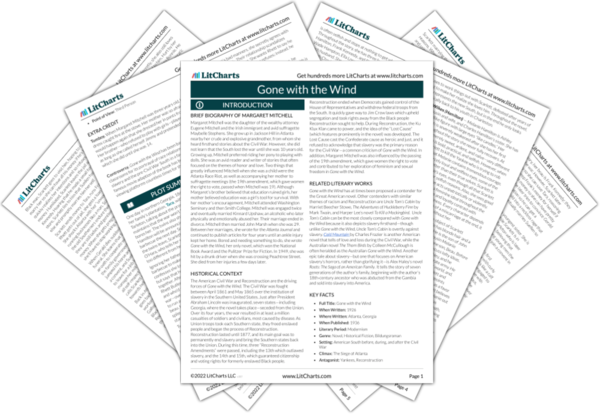Throughout Gone with the Wind, Atlanta represents the South’s resilience during and after the Civil War. In the years before the war breaks out and in the first few years of the war, Atlanta expands dramatically. Despite being such a new city, its strength becomes quickly clear: while other cities still thrive on agriculture, Atlanta rapidly modernizes and supports the Confederate war effort by becoming the manufacturing hub of the South. In this way, Atlanta represents the South’s ability to adapt and find new ways to preserve its prewar culture.
Near the end of the Civil War, as the Yankees surround Atlanta and eventually take the city, Atlanta again demonstrates its resilience. During Reconstruction, Atlanta recovers from the destruction wrought by the Yankees and briefly becomes an entirely new city where free Blacks live and work, and where formerly upper-class white Southerners, like Scarlett and Mrs. Merriweather, can reinvent themselves and even thrive in the changed postwar world. Mrs. Merriweather’s son-in-law, for instance, begins selling pies out of a pie wagon for her, while Scarlett becomes a wildly successful businesswoman who runs two lumber mills. But while Atlanta adapts in some ways, the Old South ultimately regains its ground in Atlanta. Although the town is by this time flooded with Carpetbaggers, Scallawags, free Blacks, and Republicans, all of whom change the city to more resemble the North, the Old Guard never relinquishes the city completely. Democratic groups and the Ku Klux Klan resist Reconstruction and, by the end of the story, a Democratic governor replaces Republican Governor Bullock. So though Atlanta has changed and adapted to the new world in many ways, the city’s eventual shift to favor the Democrats highlights the South’s resiliency and its unwillingness to change entirely.
Atlanta Quotes in Gone with the Wind
“Land is the only thing in the world that amounts to anything, for ‘tis the only thing in the world that lasts.”

Unlock explanations and citation info for this and every other Gone with the Wind quote.
Plus so much more...
Get LitCharts A+There was something exciting about this town with its narrow muddy streets, lying among rolling red hills, something raw and crude that appealed to the rawness and crudeness underlying the fine veneer that Ellen and Mammy had given her. She suddenly felt that this was where she belonged, not in serene and quiet old cities, flat beside yellow waters.
What a little while since she and everyone else had thought that Atlanta could never fall, that Georgia could never be invaded. But the small cloud that appeared in the northwest four months ago had blown up into a mighty storm and then into a screaming tornado, sweeping away her world, whirling her out of her sheltered life, and dropping her down in the midst of this still, haunted desolation.
Was Tara still standing? Or was Tara also gone with the wind that had swept through Georgia?
She came to the end of the long road which had begun the night Atlanta fell. She had set her feet upon that road a spoiled, selfish and untried girl, full of youth, warm of emotion, easily bewildered by life. Now, at the end of the road, there was nothing left of that girl. Hunger and hard labor, fear and constant strain, the terrors of war and the terrors of Reconstruction had taken away all warmth and youth and softness.












